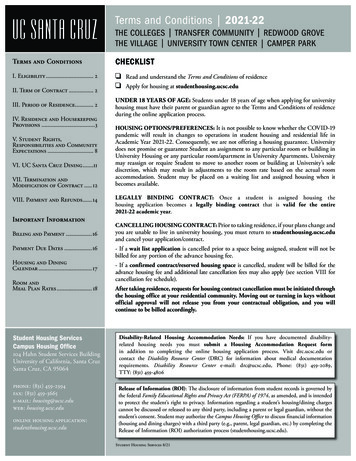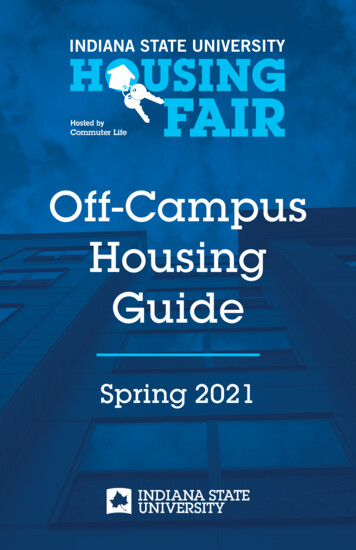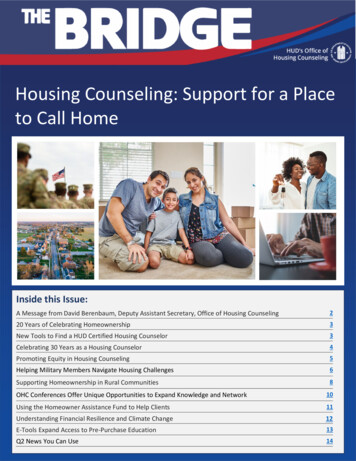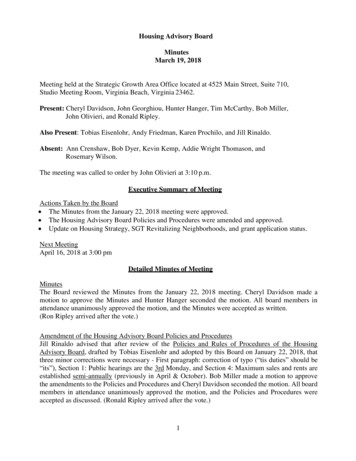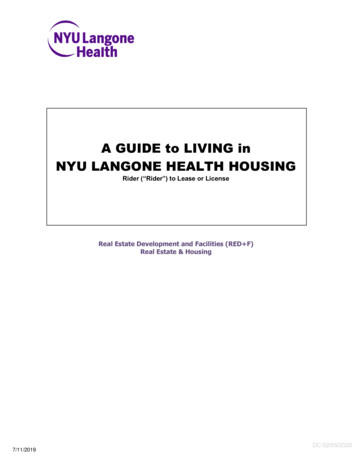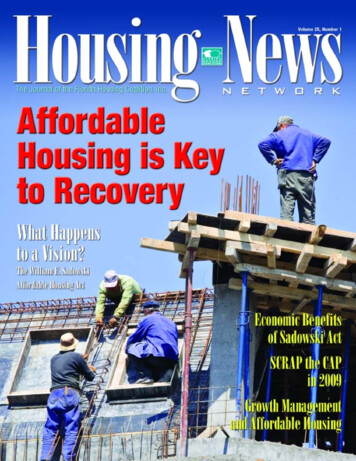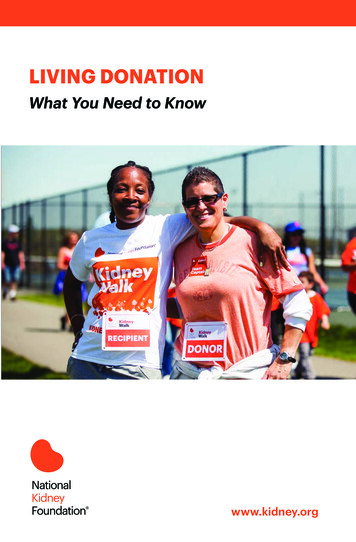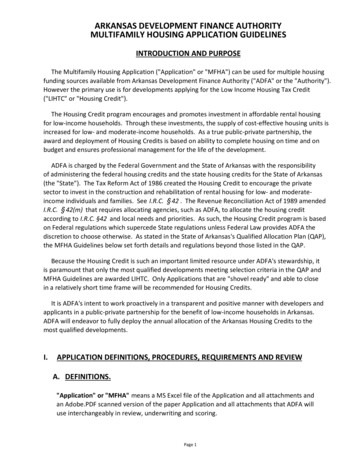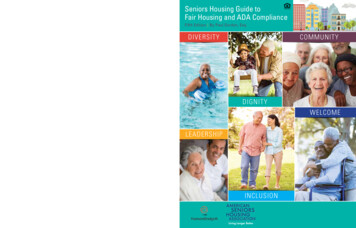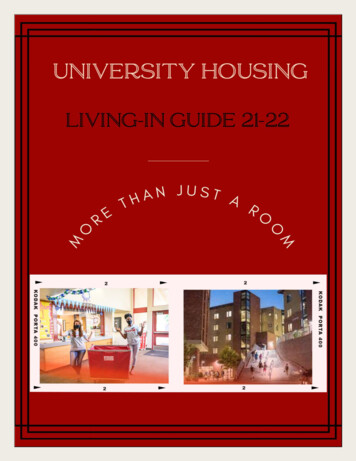
Transcription
Page 0
ContentsKitchens . 16. 1Laundry Facilities . 16Diversity Statement . 1Lockouts . 18Pillars . 1Mail Services . 18Community Living . 1Maintenance of Common Areas . 19Our Commitment to Community Respect . 1Parking . 19The “Here and Now” of Community Living . 2Pest Control . 20University Housing Community . 2Recycling . 20Community Guidelines . 2Refrigerators and Microwaves . 20Students Rights and Responsibilities . 3Room Modifications . 21University Housing Staff . 4Maintenance Requests . 21Living with a Roommate(s) . 4The Hub . 21Cleaning Suggestions . 5Thermostats . 21Room Change Requests . 5Water Damage . 22University Housing Movement Policy . 5WellCat Health Center. 22Check-In and Check-Out . 5Wildcat ID Card. 22Move-Out Tips . 6Wildcat Mail . 22Damages. 7Wildcat Recreation Center (WREC) . 23Academics . 8Vacation Housing Break Housing . 23Academic Environment . 8Vehicle Repairs. 23Leadership Opportunities . 8Zipcars . 23Residence Hall Association . 8License Agreement Summary. 23Community Council (COCO) . 9Room and Meal Costs. 23The Hub . 9Refunds and Cancellations . 24University Housing Services and Programs . 9Unit Requirements . 24Campus Connection . 9Halls Closed. 24Common Areas . 9Student Conduct . 25Dining Services/Sutter Residential Dining . 10Overview . 25Energy and Water Conservation . 13Definitions . 25Community Desk . 13Disciplinary Procedures . 26Furniture. 13Termination of License Agreements . 27Grounds . 14Appeal Process . 27Health and Safety Inspection . 14Policies and Expectations . 28Internet Access . 14
Page 1University Housing provides a setting for students and staff to actively learn, pursue new opportunities,intentionally connect, personally develop, and advance toward lifelong success.Diversity StatementUniversity Housing affirms that each person is a distinctive contributor to our community. Ourcommitment is to embrace an inclusive environment in which all persons are respected, valued, andindividually celebrated.Pillars Connecting to CampusPersonal DevelopmentLeadership & EngagementDiversity, Equity & InclusionCommunity LivingOur Commitment to Community RespectBy choosing to live on campus, student residents and staff agree to use language and displaybehavior that demonstrates commitment to the following principles, which are an integral part ofour purpose, values, and daily activities. The use of the pronoun “we” in this document refers toall University Housing community members.Residents and staff of the University Housing program are a community of people from diversecultural, racial, and ethnic backgrounds; our views encompass a broad spectrum and will differon religion, sexual orientation, and politics. However, given our diversity, we strive tounderstand the individuality and life choices of those around us. We learn from one another in anatmosphere of positive encouragement and mutual respect for each person. Our activities anddaily interactions are rooted in a genuine desire to learn from others and to give the respect thatwe ourselves desire.We recognize that differences can at times be a source of conflict. We strongly believe thatresolution of conflict always involves respectful treatment for and from all community members.We are committed to the idea that conflict is an opportunity to learn about others. Additionally,we believe that we are individually and collectively responsible for our behavior and are fullyaccountable for our actions. We take initiative and responsibility for our own learning andawareness of the differences that exist in our community and preclude all actions that diminishothers.Bigotry has no place within our community; and so, we do not have the right to denigrate otherson the basis of age, disability, national origin, sexual orientation, race, gender, or religiousaffiliation. We will never tolerate physical, verbal, or written abuse. Nor will we tolerate threats,intimidation, violence, or other forms of harassment against any member of our community.Likewise, we will not accept ignorance, humor, anger, alcohol, or substance abuse as an excusefor such behavior. Such behavior will be subject to the severest of disciplinary actions, which
may include but are not limited to immediate removal from University Housing, suspension fromthe University, or forfeiture of employment.The “Here and Now” of Community LivingAs traditions come and go, so do rules that govern on-campus residence hall and apartment living. Here atChico State, many rules have been modified to satisfy new standards and meet the expectations of ourresidents. We take pride in creating an atmosphere of mutual respect and consideration for others that isflexible and sensitive to the needs of each student within the context of a residential community.We believe most people do well in the environment provided, but there are exceptions. Some individualshave difficulty following rules that are meant to serve the community as a whole. Instead, they insist onmaking excessive noise at odd hours of the day and night. Others might not think about theinconveniences caused by having visitors without talking to their roommates in advance.An unlocked door is not an invitation to take someone’s property— it’s stealing.Individuals who cannot follow the rules are not welcome in University Housing. If our expectations aretoo much to handle and you cannot get along with your roommate, neighbors, or our rules, you will beasked to live elsewhere.We welcome students who can manage and accept “responsible freedom.” These are individuals whoexpect (and deserve) the rights and privileges of adulthood as well as accepting the responsibilities andobligations these rights and privileges demand.We encourage you to read the terms and conditions of your UH License Agreement and the sections ofthis handbook that outline the University’s rules and regulations. When submitting a UH LicenseAgreement you have obligated yourself to live by all of these regulations and will be heldaccountable for your actions.University Housing CommunityCommunity GuidelinesLearning is a continual process. Just as you must adhere to your responsibilities in order to maintain yourrights, the University Housing community accepts its responsibility to support your educational goals andprovides opportunities for your growth and development.A community is positively served by responsible behavior. Our staff is committed to promoting respectfor persons and property. We strive to maintain the rights and dignity of all students.People learn from diversity. We provide programs to strengthen interpersonal skills within the communityand to increase our awareness of various lifestyles and cultural heritages.Environment affects behavior. A positive environment promotes positive experiences. Our staff provide aliving environment that is clean, well-maintained, safe, comfortable, and conducive to educational andsocial development.Staff serve as role models. Our staff abide by the guidelines of confidentiality and responsibility. We areavailable for guidance, advice, and support.We wish you success in meeting the challenges of your upcoming year and hope that University Housingwill be a positive part of your experience at the University.
Students Rights and ResponsibilitiesThe Association of College and University Housing Officers International (ACUHO-I) represents 900plus international members globally and 6,500 student housing officers employed by colleges anduniversities worldwide. University Housing subscribes to and supports the ACUHO-I Statement ofStudent Rights and responsibilities as reprinted here:Students have the right To free access to their living accommodations To be free of intimidation or harassment To enjoy individual freedoms without regard to race, sex, national origin, disability, age, religion,sexual orientation, or political affiliation To live in a clean and secure environment To expect a regionally competitive price on University Housing accommodations and foodservice To written copies of University Housing rules and regulations or individual building policies thatgovern individual and group behavior To the respect and safety of personal property To study without interruption or interference To be free from unreasonable noise To express themselves creatively within established guidelines To expect enforcement of the University Housing License Agreement To direct access to staff who provide assistance, guidance, and support as needed To house guests within established guidelines To equitable treatment when behavior is in question To participate in student governmental bodies and University Housing department committees To individual and group educational and developmental opportunities in their living communityStudents have the responsibility. To adhere to rules and regulations To comply with reasonable requests made by staff or university officials To meet expected room and meal plan payment schedules To monitor and accept responsibility for behavior of guests To report violations of rules and regulations to appropriate staff To respect the rights of others, as stated above
To participate actively in self-governance To participate in University Housing departmental committees as requested To express themselves individually or by association with groups To participate in judicial proceedings to determine appropriate standards of behavior To contribute positively to the community by participating in educational and developmentalactivitiesUniversity Housing StaffDesk Attendants (DAs)Returning students who work the community front desks. All DAs have undergone extensive trainingand can answer most questions from residents. All DAs have passed background checks.Mail Attendants (MAs) are returning students who work within the Whitney and University VillageMail Rooms. All MAs have undergone extensive training to assist residents with picking up packages anddeliver paper mail into the communities.Resident Advisors (RAs) are returning students who mentor and advise new residents. All RAs haveundergone extensive training and can answer most questions from residents, help residents get involvedand meet new people, and appropriately address interpersonal conflict. All RAs have passed backgroundchecks and are trained in crisis management. There are always at least two RAs on call in everycommunity from 8 p.m.–8 a.m.Residence Life Coordinators (RLCs) are professional staff members who live in the residence halls.Each RLC oversees the Resident Advisors and front desk, Desk Attendants, resolves roommate conflicts,monitors room moves, and supervises Community Council (COCO) for their community. RLCs haveoffices near the front desks and can be reached by email and phone. All RLCs have passed backgroundchecks and are specially trained in crisis management. There is always an RLC on call.Residence Community Coordinators (RCCs) are professional staff members who live in the residencehalls. Each RCC oversees the Resident Advisors and administers student conduct. RCCs have offices nearthe front desks and can be reached by email and phone. All RCCs have passed background checks and arespecially trained in crisis management. There is always an RCC on call.Facility Operations staff [i.e., custodian, maintenance, and grounds] take care of the physicalenvironment in which students reside. This includes common/community areas and recreational spaces;repairing and replacing things that break; and maintaining all lawns, trees, and flower beds adjacent toUniversity Housing facilities. Residents are encouraged to become acquainted with the FacilityOperations staff assigned to their community. All are committed to making your residence hall experienceexceptional.Please note: All employees of California State University, including student employees such asResident Advisors and Desk Attendants, are required to report child abuse and neglect toUniversity Police. For more information, see CSU Executive Order 1083 (Mandatory Reporting of ChildAbuse and Neglect) and the California Child Abuse and Neglect Reporting Act.Living with a Roommate(s)Your roommate(s) is an asset and an ally in your university experience. Most people enjoy the companyof others and desire the opportunity to share opinions, interests, and good times. Sharing a room or living
unit with another individual can sometimes result in conflict. Roommates do not have to be best friends.However, one of the more rewarding experiences of living in University Housing is getting to know manydifferent people. Learning to live with the personality differences between you and your roommate is avaluable part of your education.Shortly after moving in, your RA will present you with a Roommate Agreement. This document isdesigned to help you and your roommate(s) facilitate discussion on how you expect to live this academicyear, as well as help you set up concrete guidelines that you are all comfortable with and can hold eachother accountable to. Your Roommate Agreement is a valuable tool, so be sure to give it the time andconsideration that it deserves.Cleaning SuggestionsYou and your roommate(s) share the responsibility for maintaining the cleanliness of your environment.This is a task to be worked out between you both. Vacuum cleaners can be checked out from the frontdesk. Consult the custodial staff before attempting to remove stains from the carpets or walls. They canadvise you on the proper method for cleaning without doing further damage.Room Change RequestsOften, room and community change requests are precipitated by a misunderstanding between roommates.Far greater results are obtained by efforts to work things out with your roommate than by avoiding theproblem and moving out when the going gets rough.In many instances, your Resident Advisor, or live-in professional staff can be of assistance in working outdifficulties. Generally, all roommate changes will include a discussion among those involved before thechange is approved. No room assignments will be changed until September 10th, and then only upon therequest and approval of the Residence Life Coordinator (RLC). If you transfer to another room during thesemester, please remember that you are responsible for the condition of the room and any communitydamages to the space you are vacating at the time you relocate.University Housing reserves the right to fill any vacant bed space, with a resident who has an approvedroom change request. If you are aware of an upcoming vacancy in your room or a room where you wantto move, you are required to submit a Reassignment Request. Reassignment Requests are availablethrough your Resident Center.University Housing Movement PolicyUniversity Housing offers a wide range of living occupancy options from single rooms through quads,and six-person suites. The majority of rooms within University Housing are double occupancy. When avacancy occurs in a multiple occupancy room, residents are notified that they most likely will receive anew roommate. If you have a friend who also has a vacant bed space, we encourage you to request eachother as roommates or be prepared to accept a new assigned student or a movement placement. If there isa vacant bed space in a room, UH reserves the right to fill that space.Check-In and Check-OutWhen you move into your community, you must present your Wildcat ID Card and are responsible forreporting any room condition that is not satisfactory, such as less-than-desirable furniture condition,through the electronic Maintenance Request system via your UH Resident Center. Residents are requiredto complete their Room Inventory Card and submit a Maintenance Request for any items needing repair.The electronic service request is kept on file as a record of inventory in your room. UH will assess alldamages in your room after you move out. You will be responsible for repair and replacement of any
damaged item(s) unless they are pre-existing and were documented during the check- in work ordersubmission process.Move-Out TipsDuring the academic year if you have a reassignment or are relocated to a different bed space/room, youwill need to make sure your bed space/room is returned to the same condition as it was at check-in. It isbecause after check-out is completed, a thorough room inspection is conducted by University Housingcustodial and maintenance personnel.In order to avoid additional University Housing charges, clean all items in the room and return the roomto the same condition as it was when you first checked in.Please remember there is a 50 improper check-out fee, 43 charge for lost or not returned Access Cards.To assist in your preparations for move-out, below is a checklist of commonly missed items for whichresidents are frequently charged:Bathroom (UV only) Clean shower and toilet Clean sink and vanity Vacuum and mop bathroom floorKitchen (UV & Konkow) Empty and remove contents in refrigerator, cabinets, oven, microwave, and stove top Clean sink clean Vacuum and mop kitchen floorCommon Space Do not leave any trash or unwanted items in the common space such as the bathroom, hallways,lobbies, and lounges or patios/balconiesCarpet Vacuum carpet in the entire room, even under furnitureDesk and Dresser Remove personal belongingsEmpty drawers, dust and wipe them outDust the outside and tops of itemsFurniture Move all pieces of furniture back to original locations in the roomMicroFridge Please leave your MicroFridge in your room Unplug the unit to defrost it and clean the unit 48 hours BEFORE your check out
DO NOT USE sharp objects to defrost the unit Completely clean and dry unit (this includes seals and inside/outside surfaces of the refrigerator,freezer, and microwave) Return with all parts: ice cube trays, ice scraper, top and bottom shelves, and microwave plateand ring–there will be additional charges for missing parts Leave refrigerator and freezer doors openMirrors Remove stickers or items Wipe clean with glass cleaner such as WindexWalls Remove tape and tape residues or marks Wipe off spider websWardrobe Remove personal belongings and unwanted items Wipe and dust the inside and outside, including floor and shelvesWaste Basket and Recycling Bin Empty trash and recycling in the designated trash area of your building (do not leave any trash inthe room)Whiteboard Clean and wipe off any marks*Diversion Excursion bins will be available in the lobby the week of move out for you to donate usableitems.DamagesWhen items in bedrooms and common areas are identified with damages, and there is no prior record ofpre-existing damage recorded at the time you checked into the space, then residents assigned to the roomor apartment are responsible for the cost of repair or replacement of damaged items.Maintenance Requests have been written and processed for all recorded damage and then cross-checkedto room or space conditions noted at check-in. Consequently, charges represent only new damages thatoccurred during your period of occupancy.The cost of items listed below is calculated based on average pricing of materials required, the labor coststo re-install or repair the damage(s) discovered, and administrative overhead to complete the work order,time, materials, etc.Residents are financially and judicially responsible for damages in the space to which they are assigned.Residents are jointly responsible for the public areas they share with other residents within a community,floor, or wing. If a person(s) responsible for public area damage was not identified prior to hall closing,then charges are equally distributed to all residents within that particular community, floor, or wing.
Some examples of typical charges include (costs are subject to change):ItemEstimated CostsBed Components 600 and upBiohazard 85Blinds (vertical blinds) 120Carpet (requires installation of carpet in entireroom) 985Cleaning (carpet excluded) 36 per hourCleaning-Carpet (requires professional extractionand cleaning 85Chair 100 and upDoor interior/exterior 320Dresser 335Lock-door tampering 250Refrigerator (UV/Konkow) 1,160Trash can/Recycling bin 30Vandalism 150 and upWall damage (requires Sheetrock repair, patching,and painting) 165Wardrobe/closet/shelf 350Wardrobe/closet rod 75AcademicsAcademic EnvironmentEach community has a study lounge set aside for quiet study 24 hours a day. If you are experiencingdifficulty, you may wish to contact your RA for advice.Leadership OpportunitiesCommunity engagement and involvement are essential for a healthy residential community. Leadershipeducation and experience are provided through the Residence Hall Association (RHA), Hub Productions,and the individual Community Councils (COCO).Residence Hall AssociationThe direction and vigor of the Residence Hall Association (RHA) is dependent upon and determined byyou. This recognized student organization represents all students living in University Housing. Yousupport the organization by paying the RHA fee that is included in your room fees. This fee allows you to
be admitted free to all RHA-sponsored events. More importantly, all monies generated through RHAmembership dues directly benefit residents.RHA is the umbrella organization that supports individual Community Councils (COCO) and is involvedin promoting professional development and leadership growth of all members.Do you have the experience to lead? Information about recruitment will be sent to you during thesummer. Additional leadership opportunities will be promoted at move-in and through your residentadvisor.Community Council (COCO)Individual Community Councils represent each residential community in RHA. Activities and programsare organized, directed, and supported by the students themselves with the assistance of the residence lifestaff. Residents can interview for a COCO Executive Position during the fall semester. Recruitment willbegin immediately after move-in. COCO is involved in developing active programs for residents in thecommunity as well as serving as a voice for students.The HubThe Hub is a common space at University Housing where residents can gather with friends, study, watchTV and movies, grab a snack and play video games. There are two locations, one in Sutter Courtyard andanother at University Village. From the late-night food events to weekly craft nights, the Hub is a greatplace to connect and have fun. If you are interested in getting involved, join Street Team to volunteer withthe Hub!University Housing Services and ProgramsCampus ConnectionThe Chico State Police Department offers a program called Campus Connection, our on-campus safetyshuttle. This service is provided to staff, faculty, students, and University visitors as a safe alternative towalking alone on campus during hours of darkness. When you need an urgent ride, you do not need tocall for a ride, just press the button under any “blue light.” Blue light phones are call boxes at exteriorlocations throughout the campus, which automatically dial 911 and ring directly to the Chico State PoliceDepartment when the button is pushed. The shuttle route takes 20 to 30 minutes. The hours are from 6p.m. until midnight, every night during the fall and spring semesters only.Common AreasCommon areas are intended as spaces where students can interact and enjoy the benefits of communityliving. As such, it is asked that each member of the community respectfully consider others when visitingthe common areas. Students are not permitted to sleep in public study/TV lounges, as this discouragesothers from utilizing these areas.Each community has a study lounge designated as a 24-hour study area, but may be used by groupswithin the hall for special guests and speakers by scheduling with your RCC/RLC in advance.In addition to the study lounge each community has recreation rooms designated for leisure activities.Ping-pong tables and other recreational equipment are provided by the Community Council of thatcommunity and are subject to its control. Residents of Konkow Hall are allowed to use the recreationroom located in Mechoopda Hall.
Common area furniture may not be moved to student rooms or another common area. Failure to adhere tothis policy will result in disciplinary action and a minimum charge of 130 to the students or communitiesinvolvedDining Services/Sutter Residential DiningIn 2013 the National Association of College and University Food Service (NACUFS) honored the SutterResidential Dining Center with the coveted “Silver Plate Award” for its institutional category: ResidentialDining Concepts—Medium-Sized Institution.NACUFS awards are determined by a national panel of college and university food service experts. Eachcampus program in the competition is judged in five categories: menus, merchandising and presentation,marketing, nutrition, and other program/services.The Residential Dining Concepts category is the most rigorous due to the complexities and demandsassociated with operating a residential dining program.On average, the Sutter Residential Dining Center and Wildcat Den serves more than 15,000 meals eachweek. All meals on the Meal Plan are served in Sutter Residential Dining Hall or in the Wildcat Den. Thedining service staff works closely with staff and residents in developing policies that provide the type ofservice you want as well as protecting your food-related costs.The following guidelines are delineated so that all residents will benefit from the food service program:Your Residential Meal Plan has two parts to it: the “block meals” cannot be used toward meals at otherfood venues on campus while the “Flex Cash” can be used at the Marketplace in the BMU, the threecoffee shops on campus, and the two convenience stores on campus. However, Flex Cash may not beused in the Chico State Wildcat Store.Breakfast, lunch, and dinner are served Monday through Friday, except for Thanksgiving, as well aswinter and spring breaks. Brunch and dinner are served on Saturday, Sunday, and academic holidays atthe Sutter Grill To-Go.All dine in meals at Sutter Residential Dining Center are “all you care to eat.” Please be aware of theamount of food that you may be wasting. We are all responsible for preventing waste and efficiently usingour resources. And remember, you may not take food out of the dining hall.If you have a special dietary need, please contact the Sutter Dining Services manager at 530-898-4815.The manager will be happy to work with your special needs.If you have guests who would like to dine with you, you may use one of your meal plan swipes for yourguest or they are welcome to pay the posted meal price (you may swipe in two guests per meal).Residents who swipe a guest into residential dining must remain with their guest for the duration of themeal.Please bus your own dishes to the dish room conveyor. This will reduce labor costs and provide ampleseating for your fellow residents.Take-out meal boxes are available in the event you are ill and confined to bed. To receive this service youmust have a sick card from your RA. Another person, with your sick card and your student ID, may pickup take-out meal boxes for someone who is ill.
Any student living in University Housing may invite faculty members as your guests to eat in the diningcenter at no charge. Simply provide ID and introduce them to the checker who will have them sign theguest book.AS Dining Services takes great pride in our continued efforts towards creating a sustainable operationalmodel. We have recently implemented some customer focused changes to help us further these goals: In order to reduce the impact
The Association of College and University Housing Officers International (ACUHO-I) represents 900-plus international members globally and 6,500 student housing officers employed by colleges and universities worldwide. University Housing subscribes to and supports the ACUHO-I Statement of Student Rights and responsibilities as reprinted here:

